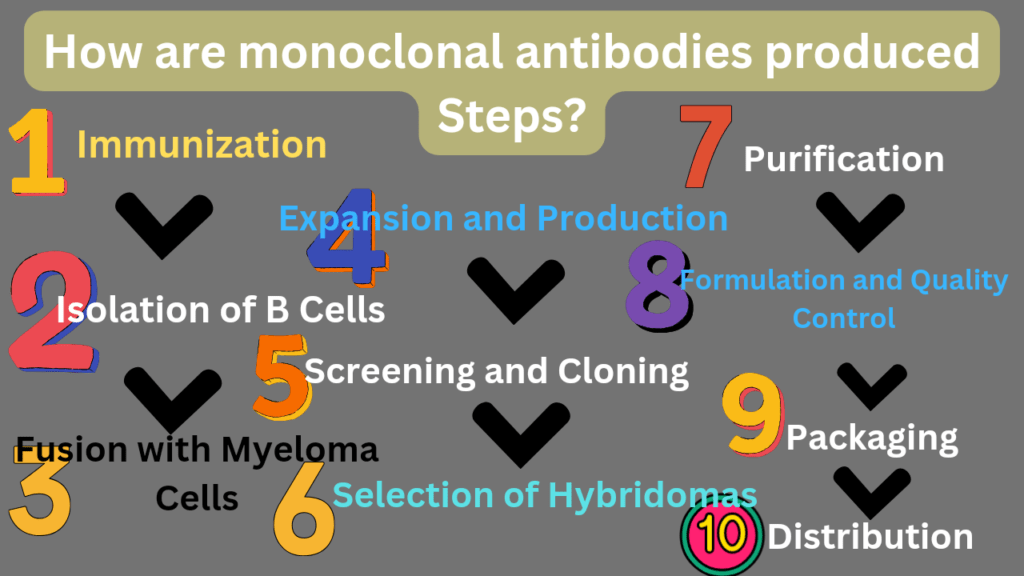Monoclonal antibodies, often abbreviated as mAbs, are a class of antibodies that are produced in the laboratory by cloning a single type of immune cell, specifically a B cell (B lymphocyte).

These antibodies are designed to target a specific antigen, typically a protein or other molecule associated with a disease or condition.
Monoclonal antibodies are a powerful tool in medicine and biotechnology and have a wide range of applications, including diagnostics, research, and therapeutic interventions.
How are monoclonal antibodies produced
Monoclonal antibodies (mAbs) are produced through a complex laboratory process that involves several steps. The key steps in the production of monoclonal antibodies include:
- Immunization: The process begins by immunizing an animal, typically a mouse or, less commonly, a rabbit or another mammal, with the specific antigen of interest. This antigen is usually a protein or molecule associated with a disease or condition. The immune system of the animal responds to the antigen by producing a variety of antibodies, including those that specifically target the antigen.
- Isolation of B Cells: After a sufficient immune response has been generated, B cells are isolated from the animal, usually from its spleen. B cells are the immune cells responsible for producing antibodies.
- Fusion with Myeloma Cells: The isolated B cells are then fused with myeloma cells, which are cancerous plasma cells that can continuously divide and produce antibodies. This fusion creates hybridoma cells, which have the ability to both produce antibodies and continuously replicate.
- Selection of Hybridomas: The hybridoma cells are cultured and allowed to grow. To select for hybridoma cells that produce the desired monoclonal antibodies, a selective medium is used. This medium usually contains a substance that prevents non-fused, normal B cells and myeloma cells from growing.
- Screening and Cloning: The hybridoma cells are screened for the production of antibodies that specifically bind to the target antigen. This is typically done through assays, such as enzyme-linked immunosorbent assay (ELISA) or immunofluorescence assays. Hybridoma cells producing antibodies that bind to the antigen of interest are then cloned to ensure that all produced antibodies have identical antigen-binding properties.
- Expansion and Production: The cloned hybridoma cells are expanded and grown in large quantities. These cells produce the monoclonal antibodies continuously. The antibodies are secreted into the culture medium.
- Purification: The culture medium containing the monoclonal antibodies is harvested and subjected to purification processes to isolate the antibodies from other cellular components, proteins, and contaminants. Common purification techniques include chromatography, filtration, and centrifugation.
- Formulation and Quality Control: The purified monoclonal antibodies are formulated into a suitable pharmaceutical formulation, which may include stabilizers, preservatives, and buffers. Quality control tests are performed to ensure the purity, potency, and safety of the final product.
- Packaging: The monoclonal antibodies are filled into vials or syringes, and appropriate packaging is done to ensure their stability during storage and transportation.
- Distribution: The final monoclonal antibody product is distributed to healthcare facilities, research institutions, or pharmaceutical companies for various applications, including diagnostics, research, and therapeutic use.
Uses of monoclonal antibodies
- Specificity: Monoclonal antibodies are highly specific in their binding to a particular antigen. This specificity is a result of the monoclonal antibodies being derived from a single B cell clone, which produces antibodies with identical binding sites. This allows for precise targeting of specific molecules.
- Production: Monoclonal antibodies are produced through a multi-step process. It begins with the immunization of an animal, typically a mouse, with the desired antigen. B cells from the immunized animal’s spleen are then isolated. These B cells are fused with myeloma cells, creating hybridoma cells that can continuously produce monoclonal antibodies. These antibodies can then be harvested and purified.
- Therapeutic Applications: Monoclonal antibodies have been widely used as therapeutic agents in the treatment of various diseases, including cancer, autoimmune disorders, and infectious diseases. They can be designed to target specific disease-associated antigens or proteins, blocking their activity or promoting their destruction.
- For example, Rituximab is a monoclonal antibody used to treat certain types of non-Hodgkin’s lymphoma and rheumatoid arthritis by targeting B cells.
- Trastuzumab (Herceptin) is used to treat breast cancer by targeting the HER2/neu receptor.
- Monoclonal antibodies like Regeneron’s REGEN-COV have been authorized for emergency use during the COVID-19 pandemic to reduce the severity of symptoms in individuals infected with the SARS-CoV-2 virus.
- Diagnostic Applications: Monoclonal antibodies are used in various diagnostic tests, including ELISA (enzyme-linked immunosorbent assay), Western blotting, and immunohistochemistry. They are employed to detect the presence of specific antigens or proteins in patient samples.
- Research Tools: Monoclonal antibodies are valuable tools in biomedical research. They are used to study the function and localization of specific proteins, allowing researchers to gain insights into various cellular and molecular processes.
- Immunotherapy: Monoclonal antibodies can be used in cancer immunotherapy to stimulate the immune system’s response against cancer cells. Immune checkpoint inhibitors, such as pembrolizumab and nivolumab, are examples of monoclonal antibodies used to block proteins that inhibit the immune response against cancer.